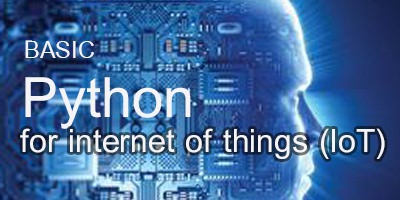หลักสูตร Python Basic
หลักสูตรนี้เหมาะสำหรับผู้ที่กำลังจะศึกษาภาษา Python ซึ่งเนื้อหาจะครอบคลุมการเขียนโปรแกรมด้วยภาษา Python พื้นฐาน เพื่อจะเป็นแนวทางในการศึกษาภาษา Python ในขั้นสูงต่อไป...

หลักสูตรนี้เป็นพื้นฐานการเรียนรู้ภาษา Python สำหรับการนำไปต่อยอดด้าน internet of things (IoT) โดยจะได้เรียนรู้แนวทางการพัฒนา IoT ด้วยภาษา python สำหรับมือใหม่ตั้งแต่เริ่ม เช่น แนวคิดของภาษา Python การติดตั้งและปรับแต่งเครื่องมือในการทำงาน เรียนรู้ฟังก์ชันพื้นฐานใน python และการนำ library ที่มีประโยชน์กับ IoT มาใช้งานได้อย่างถูกต้องเหมาะสม
Module 1: Introduction
Module 2: Installation and Startup
Module 3: Variables and Datatype
Module 4: State Management wit JSP
Module 5: Operator
Module 6: Default Parameters in Functions
Module 7: Examples on Arithmetic Operator and Functions
Module 8: Returning Multiple Values from Functions
Module 9: Formatted Output
Module 10: Format Method
Module 11: Comparison Operators and Statements
Module 12: Loop
Module 13: Strings in Python
Module 14: Lists in Python
Module 15: Examples on lists
Module 16: Sets in Python
Module 17: OOP in Python
Module 18: Packages and Modules
Module 19: Packages and OOP Example
Module 20: Dictionaries and Packages
Module 21: Global and Local Variables
Module 22: Decorators
Module 23: Reading From a File
หลักสูตรนี้เหมาะสำหรับผู้ที่กำลังจะศึกษาภาษา Python ซึ่งเนื้อหาจะครอบคลุมการเขียนโปรแกรมด้วยภาษา Python พื้นฐาน เพื่อจะเป็นแนวทางในการศึกษาภาษา Python ในขั้นสูงต่อไป...
ปัจจุบันมีการนำข้อมูลขนาดใหญ่ (Big Data) กันมากขึ้นตามหน่วยงานต่างในบ้านเรา ขั้นตอนการสร้างต้นแบบสำหรับทำนายผลทางสารสนเทศเป็นขั้นตอนที่สำคัญสำหรับการนำข้อมูลขนาดใหญ่มาใช้ง...
Django เป็นหนึ่งเฟรมเวิร์คที่ได้รับความนิยมในการนำไปพัฒนาเว็บไซต์ระดับโลกมากมาย อาทิ Instagram, Pinterest, The Washington Times, Mozilla เป็นต้น ระบบที่ขับเคลื่อนด้วยฐานข้...
ด้วยความต้องการที่เพิ่มขึ้นสำหรับนักพัฒนาแบบ Full-Stack มีความจำเป็นที่จะต้องเรียนรู้การผสมผสานข้อดีของภาษา python กับเหล่า library ยอดนิยมทั้งหลายมาสรรค์สร้างแอพพลิเคชั่น...